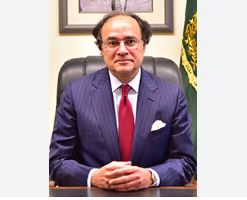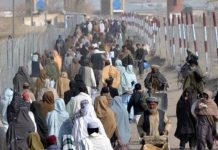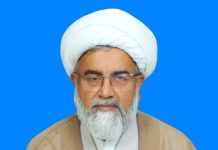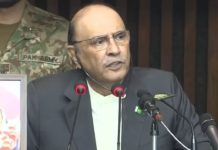DNA
ISLAMABAD, Federal Minister for Finance and Revenue on Friday appreciated the World Bank’s Thought Leadership and its insightful report titled “From Swimming in the Sand to High and Sustainable Growth,” giving a clear roadmap for propelling Pakistan to a High Middle-Income country.
He expressed these views while attending the “Roundtable on Implementing for Faster Results and Greater Impact,” organized by the financial institution on the sidelines of the World Bank Group-IMF Spring Meetings in Washington D.C.
The report laid out a clear roadmap for Pakistan to become a High Middle- Income country by 2047, with the potential for the economy to grow from GDP of over US$ 300 billion to US$ 3 trillion.
It cited that owing to the disruptive effects of the COVID-19 pandemic, Pakistan has diverged from that outlined path, thus, achieving the objective of reaching upper-middle-income status by 2047 will require returning to a path of sustained and focused structural reforms.
The finance minister emphasized that the World Bank’s focus on climate change, digitalization and human development aligned with the government’s priorities.
He commended the World Bank’s initiative to launch a single platform to enhance its operational effectiveness.
Meanwhile, the finance minister met with representatives from Moody’s Investor Service and briefed them on Pakistan’s key economic indicators and macro-economic stabilization achieved after entering into a Stand-by Arrangement (SBA) with International Monetary Fund (IMF).
He highlighted the government’s key priorities including tax and energy sector reforms, as well as the privatization agenda. The finance minister indicated the government’s intention to tap international capital markets, focussing on the Middle East and China, to support Pakistan’s economic growth and development.
He also addressed questions related to inflation, foreign exchange reserves, debt repayments, external account vulnerability, and domestic liquidity, expressing confidence in the government’s ability to address these challenges and create an environment conducive to sustainable economic growth.
He hoped that Moody’s Investor Service would upgrade Pakistan’s credit rating soon, reflecting the country’s improved economic fundamentals and the government’s commitment to reforms.
He also addressed an important “Roundtable with Investors” and highlighted Pakistan’s stable macroeconomic indicators and outline the government’s reform agenda.
Aurangzeb apprised the investors of Pakistan’s declining inflation rates, stable currency, robust growth in the agriculture sector, strong remittance inflows, rising foreign exchange reserves and a buoyant stock market.
These are positive indicators, he said, adding underscored the country’s improved economic outlook. He informed them about the government’s intention to enter into a larger and extended programme with the International Monetary Fund (IMF), building upon the successful Stand-By Arrangement (SBA).
He also discussed key priorities of the government around taxation, energy sector reforms and privatization program.
The finance minister noted that the World Bank’s focus on climate change, digitalization and human capital development aligned well with government’s priorities.
The participating investors appreciated the government’s efforts to stabilize the economy and expressed keen interest in exploring potential investment opportunities in Pakistan.
In a meeting with Saudi Fund for Development (SFD) CEO Sultan Abdulrahman Al-Marshad, Finance Minister Aurangzeb discussed potential avenues for enhanced economic cooperation between Pakistan and Saudi Arabia.
During the meeting, he briefed the CEO on his recent visit to Saudi Arabia as well as the recent visit of a high-level Saudi delegation to Pakistan.
Both sides reviewed and expressed satisfaction with the progress of ongoing development projects.
The finance minister also discussed funding of ongoing projects including Diamer Bhasha Dam and the N-25 highway from Karachi to Chaman.
He assured Pakistan would pitch bankable and investable projects to Saudi investors, highlighting the country’s investment potential and favourable policies.
The finance minister met with UK’s Minister of State for Development and Africa Andrew Mitchell and acknowledged the long-standing relations between Pakistan and the Kingdom rooted in shared history and mutual understanding.
He expressed gratitude for the UK’s support in areas such as education, health, financial management and governance.
Aurangzeb briefed him on the favourable economic indicators of the country and priority areas of taxation, energy sector and state-owned enterprise (SOE) reforms, highlighting government efforts to create a conducive environment for foreign investment and economic growth, transparency, and inclusive participation.
He also invited British International Investment (BII) to invest in bankable projects in Pakistan and thanked the UK Minister for planning a visit to Pakistan in August 2024.
Meeting with Citibank officials, the finance minister briefed them on the positive economic indicators including buoyant stock market, renewed interest of foreign buyers and institutional flows on the back of Stand-by Arrangement (SBA) signed with IMF.
He informed them that Pakistan had successfully repaid Eurobond on time, apprising them that the government had initiated discussions with IMF on a larger and extended programme and “It is fully committed to carrying out both short-term and long-term reforms in the areas of taxation, energy sector overhaul and SOE reforms.”
It is pertinent to mention here that Finance Minister is leading Pakistan’s delegation in the IMF / World Bank’s 2024 Spring Meetings being held in Washington DC.
Other delegates include Finance Secretary, Imdadullah Bosal; Secretary Economic Affairs Division, Dr. Kazim Niaz ; Governor State Bank of Pakistan, Jameel Ahmed and Senior Joint Secretary, Economic Affairs Division, Adil Akbar Khan.

















